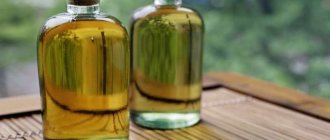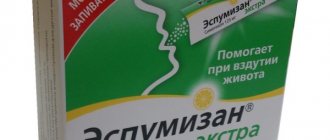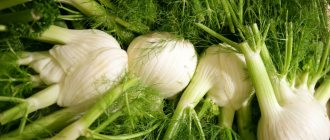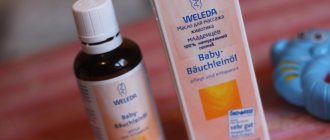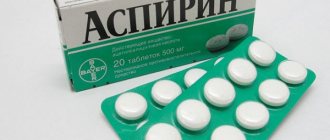Dill water for babies is one of the most effective remedies to help get rid of colic and increased gas formation in infants. Dill water is easy to prepare at home; if you don’t have time, it can be purchased ready-made at any pharmacy. Parents should know all the properties of this drug and understand how to use it for infants.
Dill water in filter bags for newborns
Composition, benefits, harm
Dill water for newborns is a healing remedy that is made from the seeds of pharmaceutical dill (fennel) and its essential oils. Contains only purified water and fennel.
Fennel essential oil contains anethole, which has a carminative effect. This helps the drug help eliminate flatulence and relieve colic. Fennel also contains carvone, which helps improve digestive processes.
In addition, dill water has:
- Antispasmodic effect;
- Antifungal and antimicrobial action;
- Laxative effect;
- Expectorant action;
- Diuretic effect.
Dill infusion is a completely harmless remedy. If abused, individual intolerance may occur in the body, which manifests itself in the form of allergic rashes or diarrhea.
Pharmacy dill water in a glass bottle
How and from what it is prepared
The main component of the remedy for infants is fennel. To prepare a decoction, you can take both the seeds and the green part of this plant. The concentration of the substance in the prepared solution should not be more than 0.1%. Dill water from a ready-made pharmaceutical concentrate (essential oil) is prepared using this method: combine fennel oil and purified water. To prepare 100 ml of medicine, you need to mix 0.1 ml of oil and 99.9 ml of clean water.
What is the benefit
The benefits of dill water for a newborn’s body are beyond doubt, since it:
- Cleanses, strengthens and dilates blood vessels;
- Eliminates inflammatory processes in the body;
- Reduces pain in the stomach and intestines;
- Regulates the functioning of the central nervous system;
- Normalizes acid-base balance;
- Restores proper kidney function;
- Strengthens the skeletal system;
- Improves the functioning of the heart, bronchi and lungs.
Note! Dill water is necessary for babies in order to normalize intestinal function and help remove gases from the body.
Baby drinks dill water from a bottle
Compound
Dill water contains the following substances:
- Esters – promote muscle toning;
- Anethole – has a carminative effect;
- Carotene is a natural antioxidant;
- Vitamins B, PP, K, C, A, P, E;
- Minerals – iron, copper, manganese, zinc, phosphorus, sodium.
All these substances have a positive effect on the child’s body and are absolutely safe.
Side effects
There are practically no side effects from drinking dill liquid. Most often this occurs due to personal intolerance and strong sensitivity to dill. Unpleasant consequences manifest themselves in the form of an allergic rash, red spots on the skin, itching, nausea, increased formation and disturbance of stool.
Note! If undesirable effects occur, you should immediately stop using the product or reduce the dosage.
Does it cause allergies in infants?
Dill, or fennel, is not a highly allergenic plant, but can provoke allergic reactions in children who are genetically predisposed to a negative reaction to herbs and foods.
How is dill beneficial for children?
Greens are very low in calories: one hundred grams of the product contains only 40 kcal.
Dill contains everything necessary for the human body
, and especially for children, vitamins and microelements such as zinc, iron and many others.
One of the most important elements contained in dill is beta-carotene
- a substance that has the property of being converted into vitamin A, which is very necessary for the body. Thanks to beta-carotene, the child’s general immunity is strengthened, and the child’s body’s ability to withstand various stresses also increases.
If there is a lack of vitamins and microelements in a child’s body, the baby may experience serious health problems, ranging from decreased immunity, due to which the child begins to get sick often, to growth retardation, impaired vision and hearing. That is why greens must be included in a child’s diet, since they, in particular dill, contain a sufficient amount of substances to maintain the normal development of the child’s body.
One of the health benefits of dill is vitamin C.
in large quantities. It is very important that as the child grows, a sufficient amount of this vitamin enters his body, because it plays a big role in strengthening the immune system, and also protects the body from various allergic reactions. A lack of vitamin C will greatly affect the child’s health during the period when he goes to kindergarten, where he begins to come into contact with other children.
Calcium
is a microelement that plays a huge role in the growth process of a child. After all, it is calcium that makes the baby’s bones strong. If there is a deficiency of this element in the body, a lot of different disorders are observed:
- Stunted growth.
- Fragility of tooth enamel.
- Pathological increase in muscle tone.
- Improper functioning of the heart.
When does a baby need dill water?
Seizures in the corners of a child’s mouth - reasons, how to treat
About 2-3 weeks after birth, many babies begin to experience colic, which is associated with an increased process of gas formation, that is, flatulence. This phenomenon is completely natural, it is due to the fact that the child’s gastrointestinal tract is adapting to a new diet - breast milk or formula.
Colic, or gas, stops bothering the baby after three months. For colic, dill water will help ease the baby’s well-being, improve digestion with artificial nutrition, and relieve the intestines of excess gases and accumulated feces.
If a child has strong continuous crying, his face is red, and his legs are convulsively tucked towards his stomach, this is a sure sign that he is suffering from colic, and it is necessary to use dill water. In addition to colic, the drug will help with spastic constipation and restless sleep, as it has a calming effect on the baby’s nervous system.
Baby crying due to colic
The benefits of dill in baby food
Dill contains vitamins and minerals such as: vitamin A, C, B1, B2, B3, B5, B6, B9, as well as potassium, copper, magnesium, zinc, sodium, phosphorus, iron, calcium, fiber. Moreover, 100 g of dill contains only 43 calories. The plant also contains flavonoids and various acids.
Dill leaves and seeds contain essential oil and active ingredients that give the plant a characteristic aroma and taste and have a beneficial effect on the condition of the skin. Only the fresh leaves contain the active ingredients, and the seeds are only effective when dried.
Dill is a powerful antioxidant that helps the body fight cellular aging due to oxidative stress.
Dill facilitates digestion, which helps eliminate intestinal gas. The antispasmodic property of dill soothes colic. In addition, it protects the intestines because it limits the spread of pathogenic bacteria.
Dill, helping the intestines, removes gas formation, bloating, rotting, and also creates optimal conditions for the development of beneficial microflora, and has anthelmintic properties. This plant also reduces the feeling of heaviness in the stomach, especially useful for chronic pancreatitis, gastritis with reduced secretion. The functioning of the gastrointestinal tract, digestion improves, appetite appears, and the secretion of gastric juice and bile increases. Dill is very useful for fighting bad breath naturally, just chew it. Dill also has diarrheal properties.
The rich vitamin and mineral composition of dill normalizes metabolic processes and helps you lose weight. Regular use of dill in the diet helps the body better protect itself from infections and improves immunity.
It has a diuretic effect and is used to treat inflammation of the urinary tract and to quickly remove harmful substances from the body. Dill infusion and powder are used for cystitis, pyelonephritis, kidney disease, and hemorrhoids.
Dill has a beneficial effect on the nervous system, eliminates insomnia, and has a moderate calming effect.
Dill seeds are used to treat pneumonia, chronic bronchitis, and asthma. They have expectorant properties, promote the removal of phlegm and help eliminate inflammation of the upper respiratory tract.
Dill helps improve the condition of heart disease and atherosclerosis. Dill seed tea increases breast milk in nursing mothers.
Dill seeds also have anti-inflammatory and healing properties, and relieve signs of fatigue around the eyes.
Dill powder is useful for seasickness. Holding it in your mouth can help relieve nausea and dizziness.
Dill seeds are used in baby food to eliminate colic in a child and normalize intestinal function.
Dill is added to children's dishes to give them a unique new flavor to diversify the baby's complementary feeding.
Dill can be present in baby food as a herb from the age of 8 months. Tea from dill seeds or dill water can be given after 28 days of the baby’s life; earlier it is not recommended due to the fact that the baby’s body adapts to the external environment, breast milk or formula, WHO recommendation.
The daily dosage of dill should be no more than 5 grams. It is usually added to children's dishes 2-3 minutes before it is ready. The dill should be boiled a little to avoid an allergic reaction. After 18 months, you can increase the dosage of dill to 10 grams.
You can introduce fresh dill to your baby closer to 2-3 years of age, if before that there was no reaction from the baby to this product. Introducing it means a couple of leaves in a salad or just as a separate snack, but not a whole bunch so that the child eats too much dill, because an overdose is possible.
Until the child reaches 12 months, it is best to add dill to children's dishes 2-3 times a week, not exceeding the daily dosage of 5 grams. After three years, the baby can be fed dill every day, but not more than 30-50 grams per day. Adults can eat dill in any quantity, depending on their well-being and tolerance to this product. We remind you that dill can have a laxative effect.
dill complementary foods
How the product works
What to do if it hurts to breastfeed your newborn
Fennel seeds, or dill, have the same effect on children's intestines as a carminative. The essential oils contained in the composition help to destroy gas bubbles in the intestines and remove them from the gastrointestinal tract. The product also helps stool move faster through the large intestine, as a result of which the pressure on its walls is significantly reduced. The effect of taking dill will be noticeable within 20-30 minutes; it will begin to act slowly, gases will be actively released, and the child will calm down.
Combination of dill water with analogues
The child does not eat enough of the formula
If the baby is bothered by severe colic, then pediatricians recommend that mothers give him dill water or drugs with a similar composition. The effect of dill infusion and analogs is exactly the same. It is not worth giving them to the child at the same time, that is, increasing the average daily dose, as this is unsafe for the baby’s health. If you alternate medications every week or every 3 days, then nothing bad will happen.
You can abandon the folk remedy only when the child fully adapts to a new life outside the mother’s womb, his intestines and stomach work normally.
Colic medications
Rules for using “dill water”
Do not forget that you need to use sterilized containers for cooking. To do this, rinse it with boiling water or use special sterilizers that are easy to use in the microwave. For babies under 1 month, only freshly prepared water is recommended.
“Dill water” is a natural, effective drug for improving a child’s well-being. However, if you decide to use this remedy, but there is no improvement, you should consult a pediatrician. Also, always keep a close eye on your baby after introducing a new one. Sometimes “dill water” can be an allergen or cause bloating. In any case, its use should be discontinued. Only compliance with the exact dosage and attentiveness to the child’s condition will make the use of the folk remedy effective.
Dill water for nursing mothers
Dill water reduces flatulence in a newborn after feedings and helps increase the amount of milk in the mother. Nursing mothers can use an infusion of dill seeds only if the baby is not allergic to herbs.
To increase lactation, you should use the decoction according to the following scheme:
- Brew 1 teaspoon of fennel seeds in a glass of boiling water;
- Drink 30 minutes before feeding 2-3 times a day;
- The course of treatment is at least 1 - 2 weeks;
- Serve warm, drink in small sips.
Important! Under no circumstances should honey, sugar or lemon be added to brewed tea. This may cause allergies in the child.
Pharmacy dill water for infants
Dill water for newborns against colic is sold in pharmacies in the form of a slightly yellow liquid with a slight anise smell and a very strong spicy taste. The product can also be found in the form of children's herbal tea or a ready-to-drink product.
Release forms
Dill water is a solution that consists of water and fennel essential oil in a ratio of 1:1000. The pharmacy chain supplies dill water in glass bottles with concentrate, packaged in 15, 50 and 100 ml. The opened container should be stored in the refrigerator for no more than a month. Closed containers can be stored for up to 2 years and cannot be frozen.
Also on sale is fennel seed powder, which is packaged in disposable filter bags. Each pack contains 20 pieces. such bags.
Instructions for use
Pharmacy dill water should be used during breastfeeding according to the following scheme:
- A child who is 3-6 weeks old is given 1/2 teaspoon at a time, gradually increasing the dosage to 1 teaspoon.
- It should be given 20 minutes before feeding 1-2, and then three times a day.
- From 1.5 months, give 1 teaspoon, before feeding, 3-8 times a day.
Dill concentrate should be given as follows:
- For newborns from 3-6 weeks, 10-15 drops, diluted in 1 teaspoon of water. Give 1-3 times a day.
- From 1.5 months, give 20-25 drops, diluted with water or breast milk, 3-6 times a day.
Additional Information. You should not give dill water to small children in large quantities. You should strictly adhere to all recommendations and not exceed the permitted dosage during preparation. It is also important to read the name on the packaging; it should say “for newborns.”
Recipes for making “dill water”
You can find ready-made “dill water” only in pharmacies with prescription departments, where pharmacists prepare medications. If this is not possible, then Plantex or homemade water will replace it.
Recipe No. 1
To prepare, take:
- fennel seeds – 1 tsp;
- hot water – 250 ml.
To begin, take a device that will help you grind the seeds. Perhaps it will be a blender; a regular coffee grinder does the job well. Next, transfer them to a glass and fill with water, leave for 45 minutes.
After 45 minutes have elapsed, the solution must be filtered. Children are given 1 teaspoon of it, mixed with the mixture or on their own. From two weeks to one month of age - 15 drops. The mixture can be stored for no more than 24 hours, and the ingredients can be prepared in advance.
The effect of the product begins 10-15 minutes after administration.
Recipe No. 2
If you don't have seeds on hand, look for fennel essential oil. Dissolve 0.05 g in 1 liter of water. Unlike the first recipe, this “dill water” can be stored for 30 days in the refrigerator. Just remember to warm it up before giving it to your baby.
Recipe No. 3
Fennel seeds are an excellent substitute for ordinary dill seeds, and the properties of such a solution are no less effective.
To prepare, take:
- dill seeds – 1 tsp;
- boiling water – 250 ml.
The seeds are poured with boiling water and left for 1 hour, then filtered.
Recipe No. 4
If you have fresh dill, make tea for your child from it. To do this, take:
- fresh dill (chopped) – 1 tbsp. l.;
- boiling water – 100 ml.
The infusion is kept for 1 hour, filtered and used in the same way as “dill water” brewed with seeds.
Sometimes a warm compress of gauze soaked in “dill water” is used. It is applied to the baby's stomach for a short time.
How to make at home
It is easy to make a decoction or infusion from dill or fennel seeds if you use any of the folk recipes. The main thing is to follow the instructions and maintain all proportions.
Folk recipes
How to make dill water for a newborn at home, the most effective recipes are below.
Recipe No. 1
Ingredients:
- 1 tablespoon fennel seeds;
- 250 ml water.
Preparation:
- Grind the fennel seeds to a powder.
- Fill with hot water.
- Cover with a lid and let stand for about an hour.
- Strain through cheesecloth.
- Cool to 37 degrees.
- Give the baby 1/2 teaspoon before feeding.
Recipe No. 2
Have to take:
- 900 ml water;
- 0.05 g fennel essential oil (buy at a pharmacy).
Mix the ingredients and place in the refrigerator. Thus, it is recommended to store the solution for no more than 30 days.
Recipe No. 3
Ingredients:
- 1 tbsp. a spoonful of fennel seeds;
- 250 ml water.
How to make a decoction step by step:
- Grind the seeds very finely and add boiling water.
- Leave for 20 minutes.
- Next, place in a steam bath and cook for 20 minutes.
- Remove from heat and leave for 40 minutes.
- Strain, cool, put in the refrigerator.
Making a decoction of fennel seeds
How to store
The product can only be stored in the refrigerator, no more than 2-3 days. It is better to prepare a fresh portion of the broth daily.
How much to give to a baby with colic?
The dosage of dill water depends on the age of the newborn. You need to measure the required amount of liquid using a syringe or measuring spoon. You need to increase the dose of the medicine little by little.
How to give an infusion to a baby
The newborn should first be given 2-3 ml of dill infusion and monitor the reaction throughout the day. If no rash, itching, or red spots appear, the product can be used every day.
Herbal tea is given according to the following scheme:
- When the baby is 3-6 weeks old, give half a teaspoon mixed with water or breast milk.
- From 1.5 months, give 1-2 teaspoons of decoction undiluted. You can also dilute with formula or breast milk.
Baby drinks from a bottle
How often to apply
For babies aged three to six weeks – 2-3 times a day. From 1.5 months you can give it 3-8 times a day.
Combination with water or mixture
Since preparations with fennel have a spicy taste and smell strongly, children do not take them very well. To improve the taste, they can be diluted with water, breast milk or infant formula.
Due to its healing properties, dill water is used by many mothers to relieve colic in newborns. It must be taken into account that if used incorrectly, it can cause a negative reaction in the child’s body. Therefore, before use, it is important to read the instructions and adhere to the indicated dosage.

